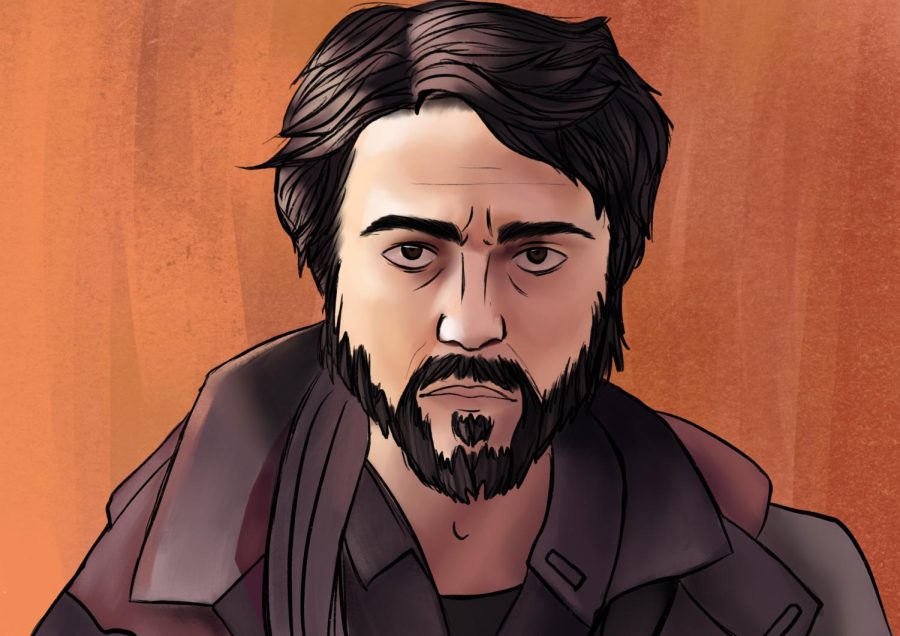Andor proves that Star Wars is more than just the Skywalker Saga
Cassian Andor is a less fortunate protagonist that introduces moral ambiguity to the Star Wars universe.
December 9, 2022
Andor tells the story of a grand empire with a fascist regime that spans a galaxy far far away. This is what Star Wars has always been, of course: a tale of heroes standing up to a tyrannical empire. But the Star Wars movies at their core are a simple conflict between evil and good, between the dark side and the Jedi. Andor, on the other hand, is not interested in simplicity.
This show depicts the lives of regular people affected by the political struggle between the empire and the rebellion. Gone are the armies of masked soldiers and grand battles between ships in space. The antagonists of Andor are imperial generals and authoritative officers with complete character arcs. Syril, one of the bad guys, goes through an identity crisis. The show often follows characters on opposing sides simultaneously, introducing moral ambiguity to a franchise long known for its good versus evil themes. It centers on the stories of a handful of individuals, staying grounded to a smaller frame within the larger conflict.
The Star Wars movies focus on the flashier parts of the conflict that include big armies fighting in grand battles with heaps of spaceships. Andor has a more nuanced approach. It is detached from the Jedis and Siths of the movies, even more so than The Mandalorian. Storm-trooper armies that the movies are known for are absent, making the brief moments in which they do appear much more intimidating. Franchise staples such as lightsabers and the Force do not exist in this show. There is no chosen one or hero’s journey because it is a story about the natural development of tension between authority and the working class. It is a rugged view of a more remote part of the Star Wars universe paired with a memorable soundscape and a great script.
Andor hooks the audience, not with big franchise visuals, but with intricate storytelling.
Cassian Andor (Diego Luna) is a self-centered rogue who gets caught in situations that highlight the empire’s injustices. He eventually realizes that his hatred for the empire manifests in the rebellion, a cause greater than any one person. In a way, this is a coming-of-age story. But it also centers around fascism, relations between natives and colonizers and financial preconditions for revolution.
The show also follows the stories of Imperial Security Bureau (ISB) officer Dedra Meero (Denise Gough), Deputy Inspector Syril Karn (Kyle Soller) and dedicated rebel Cinta Kaz (Varada Sethu) among others. These interlacing stories share the emphasis and make Andor feel like a tapestry of viewpoints on the common conflict. As the overarching plot progresses, pieces fall into place like a jigsaw puzzle, which makes the watch satisfying.
The show is realistic in that miracles are rare. When stakes are high, characters can and will die. But when they do, the show does not try to capitalize on the audience’s lament. It acknowledges the heartbreak and moves on, emphasizing the harsh reality of the rebels’ lives. It recognizes death as an inevitability of the larger political struggle. The following contains spoilers for season 1 of Andor.
Despite the appeal, Andor never lingers too long on its best sequences. Its most powerful moments come and go, serving only to move the story forward.
In episode nine, Cassian repeatedly asks Kino “how many guards on each level?” Kino, who tries to follow the rules until he gets out of the water-locked prison, refuses to say anything because he knows of Cassian’s desire to escape. Yet, towards the end of the episode when the two learn that a prisoner who finished their sentence on one level was put back into another, they realize that no one was getting out. Cassian asks one last time “how many guards on each level?” and Kino ends the episode with the line “never more than 12.”
Upon learning the truth, Kino fosters newfound anger towards the prison authorities, develops more faith in Cassian and foreshadows the prison escape sequence in the next episode, all in four short words. Andor often builds up character development and pays it off with a memorable story beat.
The next episode, titled “One Way Out”, portrays Cassian and Kino convincing the inmates on all levels to stand up and overthrow the prison guards. Kino persuades the inmates that the “one way out” of the hole they were trapped in was to come together and fight. The script implies that unity from below is the one way out of oppression from above. Kino was the source of that unity, and his words serve as a catalyst for revolution.
In the sequence when prisoners are jumping into the ocean to swim for their freedom, Kino looks at Cassian one last time before he is pushed into the water, and says with sadness and acceptance “I can’t swim”. Kino’s role ends with a sudden gut punch, and his name is never brought up again. His inspiring character growth makes the abrupt tragedy impactful. The show knows that the grounded story it is trying to tell has little room for mourning, until the final act.
The show ends with a riot at the funeral of Cassian’s mother. This set piece is a great capstone for the show as it ties the themes of oppression and rebellion to Cassian grieving the death of his only parental figure.
Andor was created by the screenwriter of the Bourne series, Tony Gilroy. Because of this, Andor shares a lot of parallels with the thriller genre. The more serious atmosphere makes characters like Cassian and Dedra constantly appear irritated. This is done to build a darker, stoic tone, but it can be off-putting for fans of the franchise who prefer the charm of the movies, especially since the Jedis and baby Yodas that defined Star Wars are absent here. Even Emperor Palpatine, the big bad guy of Star Wars, is only ever mentioned once.
Yet, the somber mood works in this show because consequences are not presented with gore or drawn-out death scenes, but instead with short and effective gut-punch moments like Kino’s “I can’t swim”. After a long period of content relying on nostalgia, Andor proves that Star Wars is more than just the Skywalker Saga.









